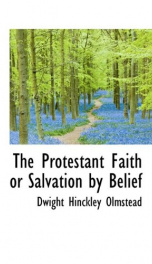the protestant faith or salvation by belief

Purchase of this book includes free trial access to www.million-books.com where you can read more than a million books for free. This is an OCR edition with typos. Excerpt from book: divine mandate within him, and then what end shall there be to his noble aspirations ! He will be prepared to enteraye, will actually have already entered on immortal life. Alas, that so many pure natures should have struggled and sorrowed under so much ignorance and superstition in endeavoring to reconcile their own inward promptings with the so-called inspired, but really most unreasonable faith, said to have been " once deliv- " ered to the saints!" The Nature Of Beliefs And Opinions. I now pass to the consideration of the second main proposition, viz.: that all belief is involuntary, and is that which, of our own will, we can neither choose, change, nor control. It is therefore not blameworthy. This position is not new, having received the sanction of some of the best minds in every age. Concerning the followers of the once famous Duns Scotus, Sir James Mackintosh says: "The Scotists affirmed the blameless- " ness of erroneous opinions; a principle " which is the only effectual security for con- " scientious enquiry, for mutual kindness and " for public quiet." Mackintosh also declares : " It is as absurd "to entertain an abhorrence of intellectual " inferiority or error, however extensive or " mischievous, as it would be to cherish a "warm indignation against earthquakes or "hurric'anes."f Other writers are equally to the point. A very old one says: "We know that faith " comes by persuasion, and is not to be con- " trouled."J Another, still older, and of high authority in the Church, says : " Religion by compul- "sion is no longer religion; it must be by " persuasion, and not by constraint. Religion " is under no control, and cannot by power "be directed."§ Eth. Phil. Vol. I. p. 46. f Ibid. p. 150. FMchier, Bishop of Nismes, Lett. 10. § Lacta... --This text refers to an alternate Paperback edition.
Users who have this book
Users who want this book
What readers are saying
What do you think? Write your own comment on this book!
write a commentif you like the protestant faith or salvation by belief try:
Other books by this author
Do you want to exchange books? It’s EASY!
Get registered and find other users who want to give their favourite books to good hands!


